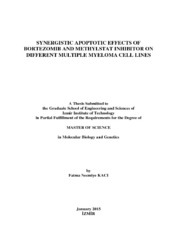Please use this identifier to cite or link to this item:
https://hdl.handle.net/11147/4309| Title: | Synergistic Apoptotic Effects of Bortezomib and Methylstat Inhibitor on Different Multiple Myeloma Cell Lines | Other Titles: | Bortezomib ve Metilstat İnhibitörünün Farklı Multipl Myeloma Hücre Hatları Üzerindeki Sinerjik Apoptotik Etkileri | Authors: | Kacı, Fatma Necmiye | Advisors: | Baran, Yusuf Saydam, Güray |
Keywords: | Multiple myeloma Cancer Bortezomib |
Publisher: | Izmir Institute of Technology | Source: | Kacı, F. N. (2015). Synergistic apoptotic effects of bortezomib and methylstat inhibitor on different multiple myeloma cell lines. Unpublished master's thesis, İzmir Institute of Technology, İzmir, Turkey | Abstract: | Multiple myeloma is one of the common hematological malignancies that affects plasma cells. Bortezomib, proteasome inhibitor, is an anticancer agent used for the treatment of multiple myeloma while methylstat is a demethylase inhibitor having anticancer potential. In this study, we investigated antiproliferative and apoptotic effects of methylstat alone or in combination with bortezomib. We also examined the genes involved in methylstat induced apoptosis. Cytotoxic effects of bortezomib and methylstat on U266 and ARH77 cells were demonstrated by MTT cell proliferation assay. To understand the apoptotic effects of these agents, loss of mitochondrial membrane potential was investigated by JC-1 method while phosphatidylserine localization was investigated by Annexin V assay. Cell cycle analysis in response to Bortezomib and Methylstat alone or in their combination were measured by flow cytometry. Changes in expression profiles of 84 genes underlying apoptosis, cell cycle control, DNA damage repair, and invasion and metastasis in response to Methylstat were determined by PCR Array. Our results demonstrated that both bortezomib and methylstat have antiproliferative and aoptotic effects in a time and dose dependent manner. Combination of bortezomib and methylstat induced apoptosis significantly as compared to any agent alone. In conclusion, we suggest methylstat as candidate agent for the treatment of MM after in vivo analyses. | Description: | Thesis (Master)--Izmir Institute of Technology, Molecular Biology and Genetics, Izmir, 2015 Full text release delayed at author's request until 2018.02.06 Includes bibliographical references (leaves: 42-47) Text in English; Abstract: Turkish and English x, 47 leaves |
URI: | http://hdl.handle.net/11147/4309 |
| Appears in Collections: | Master Degree / Yüksek Lisans Tezleri |
Files in This Item:
| File | Description | Size | Format | |
|---|---|---|---|---|
| T001323.pdf | MasterThesis | 2.49 MB | Adobe PDF |  View/Open |
CORE Recommender
Items in GCRIS Repository are protected by copyright, with all rights reserved, unless otherwise indicated.